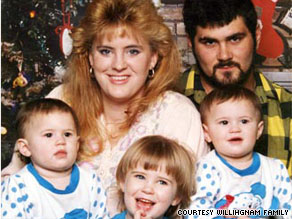I've blogged twice now (here and here) about Cameron Todd Willingham, the Texas man who was tried, convicted, and eventually executed on what now appears to be really bad "expert" testimony. In a nutshell, arson "experts" were convinced that Willingham intentionally started a house fire intending to kill his children (all three died). There was no other evidence against Willingham — just the opinion testimony by arson "experts" who were, as it turned out, not experts at all.
This is, sadly, quite common in Texas — people convicted and/or executed for "bad science" offered as evidence through opinion testimony. So overwhelming pervasive is the problem that Texas decided to adopt a Forensic Science Committee.
Well, guess what happened when the Forensic Science Committee was set to look at the case of Cameron Todd Willingham? From yesterday's New York Times:
Gov. Rick Perry replaced the chairman and two members of the state’s Forensic Science Commission, two days before the commission was to hear evidence that Texas executed an innocent man. The new chairman canceled the hearing, at which an arson expert was to present a report critical of the arson analysis that led to the conviction of the man, Cameron T. Willingham. Mr. Willingham, above, was executed in 2004 after being convicted of setting a 1991 fire in which his three children died. Governor Perry, who was in office at the time of the execution, has expressed confidence in Mr. Willingham’s guilt. “This is like the Saturday night massacre,” said Barry Scheck, co-director of the Innocence Project, which has been working on the case. “It’s like Nixon firing Archibald Cox to avoid turning over the Watergate tapes.”
Scheck, who has said there is "no doubt" about Willingham's innocence, was alluding to former President Richard Nixon's firing of independent special prosecutor Archibald Cox, who had been probing the Watergate scandal in 1973.
The governor's office claimed that there was nothing unusual about replacing members of the Forensic Science Commission, saying that some of their terms have expired.
The Houston Chronicle adds some color to the story. One of the commission members ousted by Governor Perry said nothing about his term expiring.
The report by the arson expert (Craig Beyler) concludes that the findings at the heart of Willingham's conviction — that the fire that killed his daughters was set deliberately — "could not be sustained" by either modern science or the standards of the time.
Two previous reports by other experts also concluded that the fatal blaze was not arson, but Beyler's is the first commissioned by the state.
Regarding the Beyler report, the Chronicle writes:
Beyler, a nationally known fire science expert, was commissioned not by a newspaper or an advocacy group, but by a state commission chaired by Perry's own political appointee.
So, when Beyler concluded recently there was no credible scientific evidence to support the finding that the Willingham fire was arson, and likened the investigative methods used to folklore and mysticism rather than science, it appears that the governor had to find a way to silence him.
At first, Perry tried to discredit Beyler, using air quotes in an interview with The Dallas Morning News two weeks ago to refer to “latter-day supposed experts” who have cast doubt on Willingham's conviction.
Then, this week, days before Beyler was scheduled to present his findings to the Texas Forensic Science Commission in a public meeting Friday, Perry made a move so blatantly political that it was stunning even for a candidate locked in a tight primary battle.
He canned the commission's chairman, Sam Bassett, his own two-term appointee, and replaced him with a new chairman who promptly canceled Friday's meeting on the Beyler report.
It's pretty clear what's going on. Governor Perry was governor when Willingham was executed. He refused to grant clemency for Willingham, at the time ignoring the conclusions of many many arson experts who said that the conviction of Willingham was based on "folklore" forensics conducted by untrained non-experts. Now, in the middle of a heated re-election bid, the governor is trying to sweep the Willingham execution under the rug by removing state investigators intent on looking into the matter.


